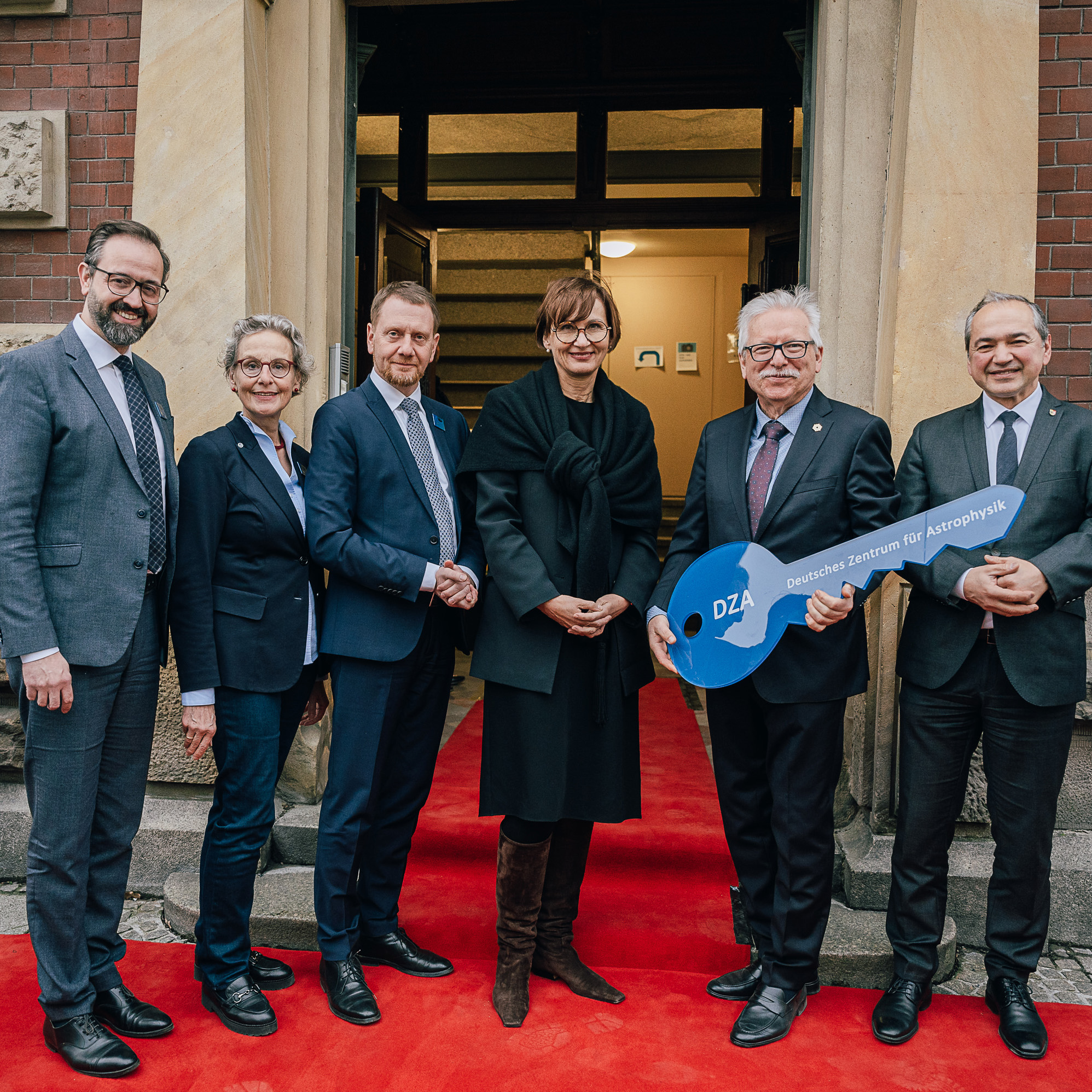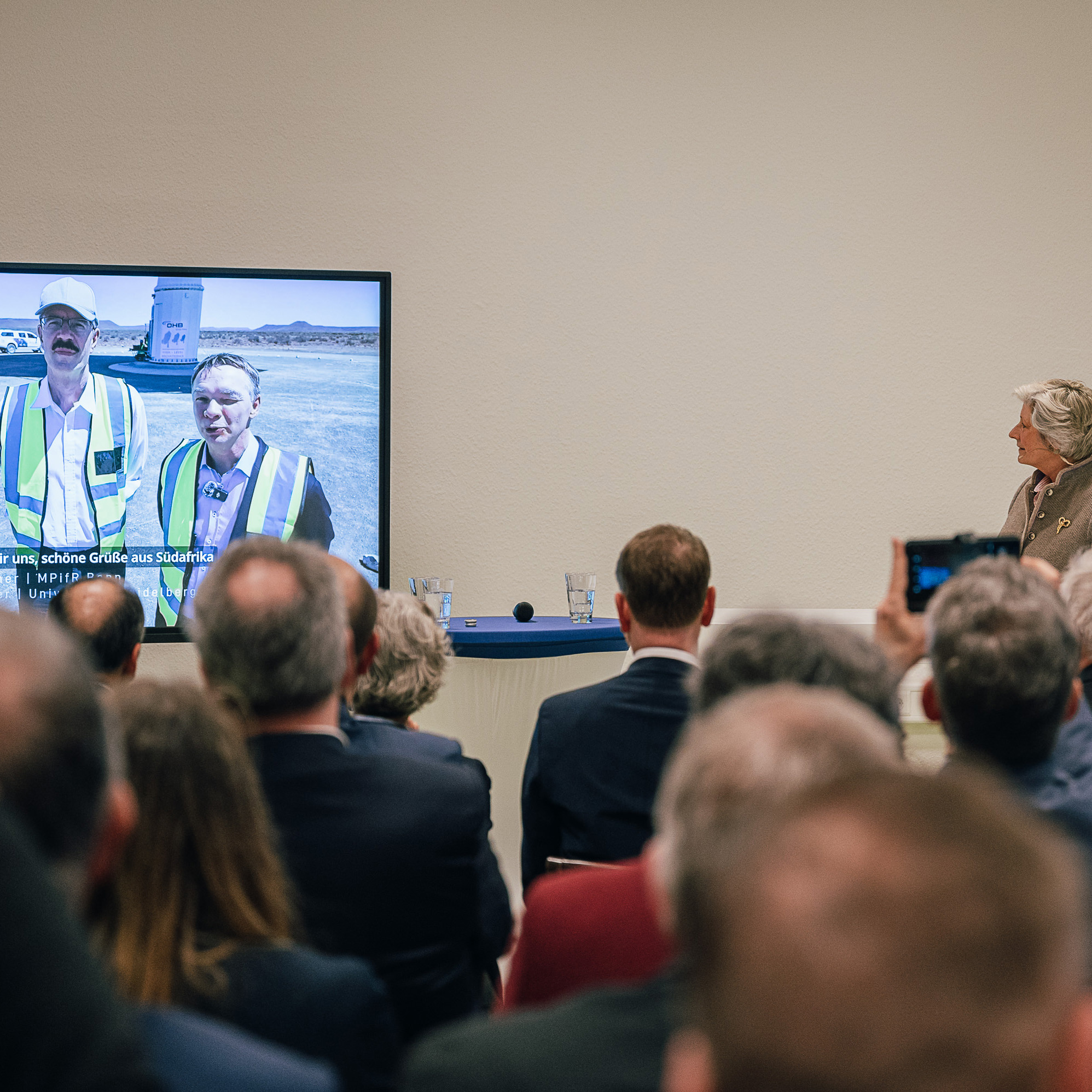German Centre for Astrophysics opens interim location in Görlitz. The building provides workplaces for around 100 employees.
The German Centre for Astrophysics (DZA) today officially opened its interim location in the historic post office building on Postplatz in Görlitz. The inauguration ceremony was attended by Federal Research Minister Bettina Stark-Watzinger and Minister President Michael Kretschmer, who symbolically handed over the key to the designated founding director of the DZA, Prof. Dr. Günther Hasinger.
Prof. Hasinger, who also holds a professorship of excellence at the Technical University of Dresden, emphasized the importance of the center for the region: "The DZA will not only be an important institution for astrophysics in Germany, but will also make a significant contribution to structural change in Upper Lusatia."
The inauguration ceremony was attended by personalities from politics, business and science, including the Saxon Science Minister Sebastian Gemkow, the Rector of TU Dresden, Prof Ursula Staudinger, and the Mayor of Görlitz, Octavian Ursu. The interim premises on two floors in the historic post office building on Postplatz in Görlitz will provide workplaces for the center's first 100 or so employees until the move to the permanent location takes place.
Frank Bertoldi, first chairman of the Association for Data-Intensive Radio Astronomy and professor at the Argelander Institute for Astronomy in Bonn, emphasizes the importance of this milestone: "The DZA opens up completely new and forward-looking perspectives for Upper Lusatia and for German astrophysics. On behalf of the Association for Data-Intensive Radio Astronomy, I would like to congratulate my colleagues in Saxony on this further major step and look forward to working with them in the future."
The panel discussion entitled "The German Centre for Astrophysics: A beacon for sustainable structural change in Upper Lusatia", which was attended by Federal Minister Stark-Watzinger, Minister President Kretschmer, Science Minister Gemkow and Rector Prof. Staudinger as well as Prof. Hasinger, highlighted the role of the future DZA in the structural change of Upper Lusatia. In his statement, Prof Hasinger emphasized that the DZA would not only contribute to research, but also to strengthening the regional economy and education. "Many examples show this: Astronomical research changes regions sustainably. With its unique combination of research and development in IT, sensor technology and materials research and its need for production facilities, the DZA will provide economic impetus and create at least 3,000 sustainable jobs at the center and in the surrounding area," said Prof. Hasinger.
Prof. Uwe Cantner, Chairman of the Commission of Experts for Research and Innovation (EFI), also addressed the impetus for structural change provided by research in his keynote speech on the topic of "Structural change through research".
After the event, the guests had the opportunity to visit the DZA's premises in the Post Office building on Postplatz, which are currently under construction. The move is planned for the beginning of March.
"Radio astronomy not only provides a considerable gain in knowledge about the secrets of our cosmos, but also produces huge amounts of data that will continue to grow with the use of larger telescopes - such as the SKA Observatory in South Africa and Australia," emphasized Michael Kramer, Director at the Max Planck Institute for Radio Astronomy in Bonn, adding: "The DZA plays a decisive role in successfully meeting these technological challenges."
photo credits: Paul Glaser Fotografie
Parallel press releases:
Dresden University of Technology
GERMAN CENTER FOR ASTROPHYSICS – RESEARCH. TECHNOLOGY. DIGITIZATION. BEACON OF WORLD-CLASS ASTRONOMICAL RESEARCH OPENS INTERIM PREMISES IN GÖRLITZ
About the DZA:
With the German Center for Astrophysics – Research. Technology. Digitization. (DZA), we are creating a major national research center with international reach that promotes resource-saving digitalization, develops new technologies, ensures transfer, and creates new prospects for the region – firmly rooted in Lusatia, Saxony. The DZA is a joint initiative of astronomy and astroparticle physics in Germany. The initiative includes many renowned scientists, and is supported by the major German scientific organizations. It will be located in Görlitz and the Bautzen region. After the construction phase, there are plans for an annual budget of approximately EUR 170 million during the final expansion phase, and the center itself will employ more than 1,000 people. The DZA is currently under construction and is being funded as a project before being established as a legally independent center in 2026. In this initial phase, TU Dresden is responsible for the project with the support of Deutsches Elektronen-Synchrotron DESY.


